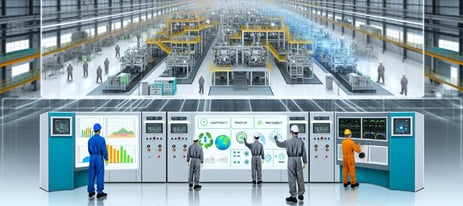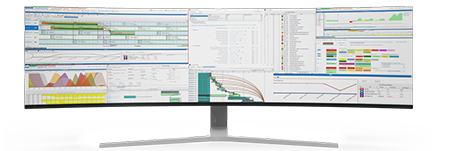Sustainable Manufacturing Practices and Resource Planning
In today's industrial manufacturing landscape, sustainability has become more than just a buzzword. It's a critical aspect of business operations that directly impacts profitability, reputation, and long-term viability. As a Production Planner in an industrial manufacturing facility, your role is pivotal in ensuring sustainable manufacturing practices are integrated into your daily operations.
In this blog, we'll explore the importance of sustainable manufacturing practices and look into the integration between resource planning systems like PlanetTogether and leading ERP, SCM, and MES systems such as SAP, Oracle, Microsoft, Kinaxis, and Aveva.

The Evolution of Sustainable Manufacturing
Before we look into the technical aspects of resource planning integration, let's understand why sustainable manufacturing practices are gaining prominence.
Environmental Concerns: The industrial sector is a significant contributor to environmental pollution. Sustainable manufacturing focuses on reducing the environmental footprint of production processes, leading to reduced emissions, waste, and energy consumption.
Regulatory Compliance: Governments worldwide are enacting stricter regulations to curb pollution and promote sustainable practices. Non-compliance can lead to hefty fines and damage to your company's reputation.
Consumer Demand: Modern consumers are more environmentally conscious and prefer products from companies with sustainable practices. Embracing sustainability can give your products a competitive edge.
Cost Savings: Sustainable practices often lead to cost reductions through improved resource efficiency, reduced waste, and energy savings.
Now, let's explore how integrating resource planning systems like PlanetTogether with ERP, SCM, and MES systems can help you implement sustainable manufacturing practices effectively.


Resource Planning Integration for Sustainable Manufacturing
PlanetTogether is a powerful production planning and scheduling software that streamlines manufacturing operations. To fully embrace sustainable manufacturing, it's essential to integrate PlanetTogether with other systems like SAP, Oracle, Microsoft, Kinaxis, Aveva, and MES. Here's how this integration can benefit your production planning efforts:
Real-time Data Visibility
Integrating PlanetTogether with ERP, SCM, and MES systems allows you to access real-time data from various departments. This visibility enables you to make informed decisions based on up-to-date information regarding inventory levels, demand forecasts, and resource availability.
Demand Forecasting and Inventory Optimization
Accurate demand forecasting is critical for sustainable manufacturing. By integrating PlanetTogether with ERP systems like SAP and Oracle, you can ensure that your production plans align with market demand. This helps prevent overproduction and reduces excess inventory, which can be a significant source of waste.
Resource Allocation and Optimization
Efficient resource utilization is a key component of sustainable manufacturing. Integrating PlanetTogether with SCM systems like Kinaxis enables you to allocate resources effectively based on real-time demand and capacity constraints. This minimizes the risk of overloading certain resources while others remain underutilized.
Energy Efficiency and Environmental Impact Reduction
PlanetTogether's integration with MES systems like Aveva allows you to monitor energy consumption and production processes in real-time. This data can help you identify areas where energy efficiency improvements can be made, reducing both costs and environmental impact.
Waste Reduction and Recycling
Sustainable manufacturing involves minimizing waste and promoting recycling. Integration between PlanetTogether and ERP systems can help you track materials throughout the production process and identify opportunities for waste reduction and recycling.
Compliance and Reporting
Many ERP systems offer compliance and reporting modules that can assist in adhering to environmental regulations. Integration with such systems ensures that your manufacturing processes align with legal requirements, avoiding potential fines and penalties.
Continuous Improvement
By integrating PlanetTogether with these systems, you create a closed-loop feedback system that allows you to continually improve your manufacturing processes. You can track performance metrics, identify bottlenecks, and implement changes to enhance sustainability.
As a Production Planner in an industrial manufacturing facility, embracing sustainable manufacturing practices is not just a choice; it's a necessity. The integration of resource planning systems like PlanetTogether with leading ERP, SCM, and MES systems plays a pivotal role in achieving sustainability goals.
By harnessing the power of real-time data visibility, demand forecasting, resource optimization, energy efficiency, waste reduction, compliance, and continuous improvement, you can steer your manufacturing facility towards a more sustainable future.
Sustainable manufacturing is not just about protecting the environment; it's about ensuring the long-term success and resilience of your business in a world where sustainability is no longer an option but a mandate. So, start integrating your resource planning systems today and lead the way in sustainable manufacturing practices.
Are you ready to take your manufacturing operations to the next level? Contact us today to learn more about how PlanetTogether and integrated scheduling solutions can help you achieve your sustainability goals and drive success in the industrial industry.